SRMAP Departmental Events
- 73rd Outreach Programme of IIRS-ISRO on “Overview of Geo-processing using Python” January 8, 2021
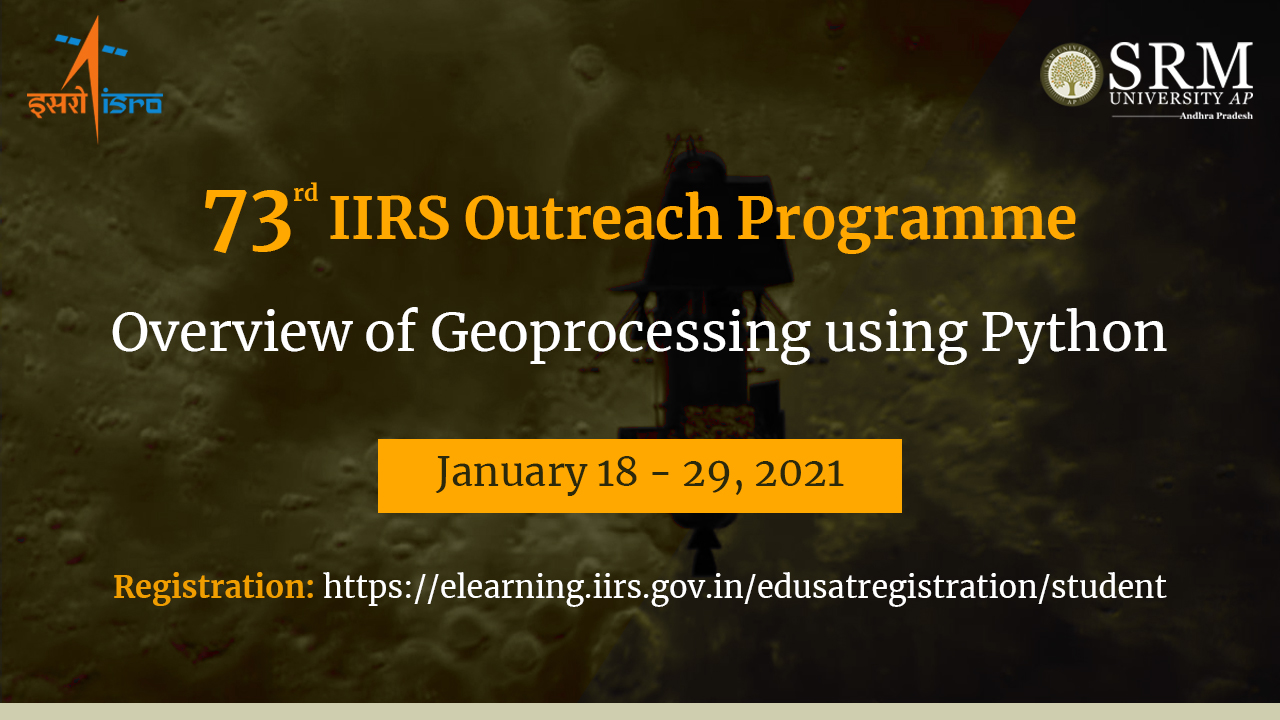 Students of SRM University AP, Andhra Pradesh get the opportunity to attend the 73rd outreach programme titled “Overview of Geo-processing using Python” arranged by Indian Institute of Remote Sensing (IIRS) -Indian Space Research Organization (ISRO). In the modern era, satellite imagery fused with the power of Geographic Information System enhances environmental management system by providing solutions pertaining to issues such as disasters, global climate change, natural resources, wildlife, and land cover. Effectively processing the massive data to decipher useful information is considered the most challenging aspect of geospatial technology. This programme encompassing a session from January 18, 2021 till January 29, 2021 will enable the participants to use Python to visualize geospatial data and derive the desired knowledge, mitigating the aforementioned challenge. Students of SRM AP are encouraged to attend this programme to broaden the prospect of achieving their career aspirations.
Students of SRM University AP, Andhra Pradesh get the opportunity to attend the 73rd outreach programme titled “Overview of Geo-processing using Python” arranged by Indian Institute of Remote Sensing (IIRS) -Indian Space Research Organization (ISRO). In the modern era, satellite imagery fused with the power of Geographic Information System enhances environmental management system by providing solutions pertaining to issues such as disasters, global climate change, natural resources, wildlife, and land cover. Effectively processing the massive data to decipher useful information is considered the most challenging aspect of geospatial technology. This programme encompassing a session from January 18, 2021 till January 29, 2021 will enable the participants to use Python to visualize geospatial data and derive the desired knowledge, mitigating the aforementioned challenge. Students of SRM AP are encouraged to attend this programme to broaden the prospect of achieving their career aspirations. Programme Schedule: Please Click Here
Registration Link: Please Click Here
For further details, Visit Here
Continue reading → - Insightful workshop on Blockchain and IOT to challenge your intellect and mettle to solve real-life problems January 8, 2021
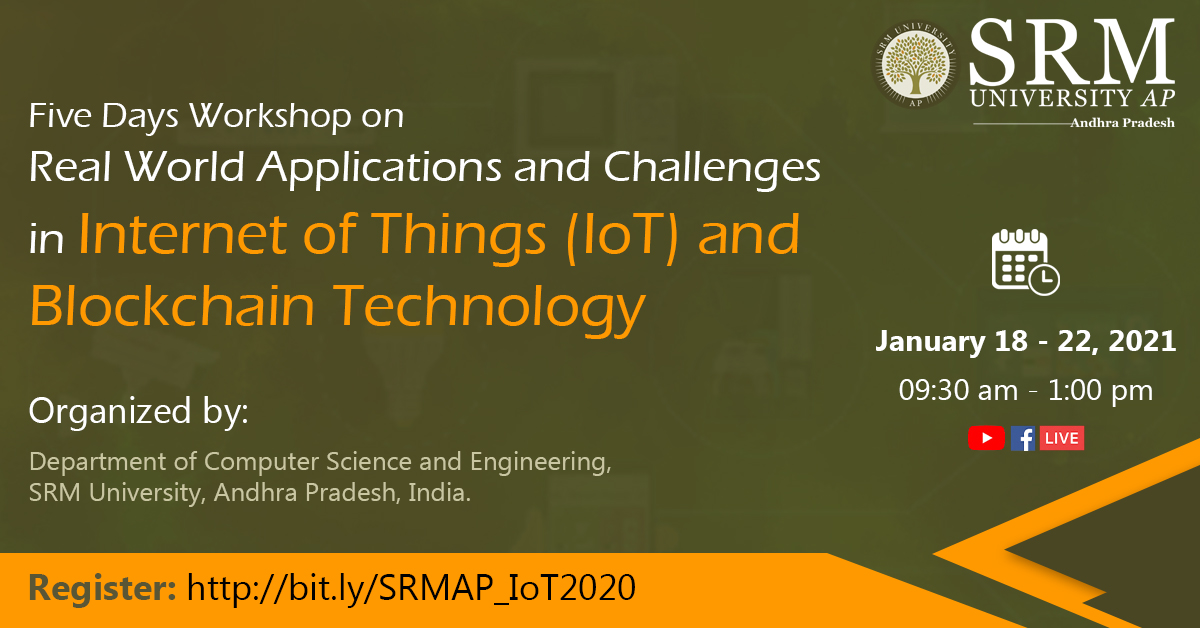 Department of Computer Science and Engineering is conducting a five-day workshop on the real-world applications in the Internet of things and Blockchain Technology from January 18-22, 2021. The workshop has been organised in association with APPLY VOLT. Eminent speakers from reputed institutes such as the University of California, San Diego, USA; IIT Kharagpur, NIT-Warangal, MNIT Jaipur will be sharing their valuable opinions and insights in the workshop. The registration for the workshop ends on January 16, 2021.
Department of Computer Science and Engineering is conducting a five-day workshop on the real-world applications in the Internet of things and Blockchain Technology from January 18-22, 2021. The workshop has been organised in association with APPLY VOLT. Eminent speakers from reputed institutes such as the University of California, San Diego, USA; IIT Kharagpur, NIT-Warangal, MNIT Jaipur will be sharing their valuable opinions and insights in the workshop. The registration for the workshop ends on January 16, 2021.Internet of Things (IoT) is one of the most exciting trends and innovation in the recent history of technological advancement covering a wide range of applications like healthcare, entertainment, appliances control & utility services, security, defence, traffic management, transportation, home & industrial automation, remote monitoring, smart cities, smart farming, smart grid etc. IoT is the network of physical devices accessed through the Internet. IoT market is likely to experience year-on-year growth, rising to more than 50 billion devices, digitally connected across the globe by 2020, and representing $19 trillion in business opportunities. The graduate and postgraduate engineers have substantial job opportunities because of a wide range of IoT applications. Research scholars have a tremendous opportunity to work in different applications of IoT.
This workshop aims to impart knowledge about the real-time applications of IoT among students and the teaching community. Experts from academia and industry have been invited to deliver lectures about the current and emerging trends in IoT and Blockchain technology. The workshop will focus on theoretical and hands-on experience in IoT and Blockchain Technology to interface the things for different applications using Raspberry Pi/Arduino/Intel Galileo toolkits with devices such as LEDs, sensors, actuators etc. The theoretical session will be conducted in the morning hours and practical sessions in the afternoon. To conclude the workshop, a small project will be given to the students as a task, and the winners will be awarded a certificate of participants.
To register: http://bit.ly/SRMAP_IoT2020
Registration Closes on: January 16, 2021
Schedule of the Workshop: View Complete Schedule of the Workshop
Continue reading → - Department of Computer Science invites Dr Sridharan R to share insights on “Baby steps towards Quantum Computing” November 28, 2020
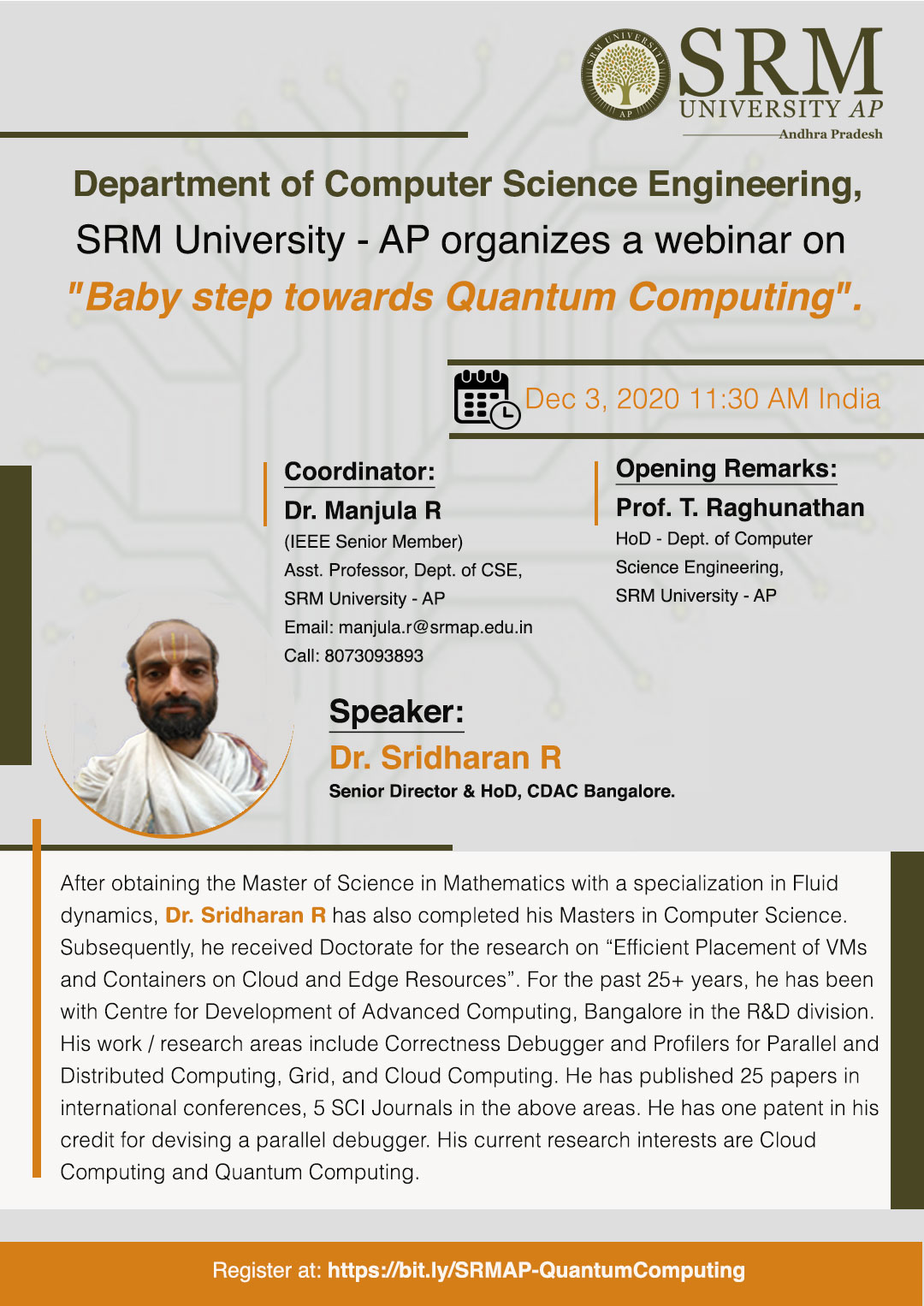 Dr Sridharan R will be hosting a session arranged by the Department of Computer Science, SRM University-AP, Andhra Pradesh on December 3, 2020, at 11.30 AM. During the session, the revered mathematician will be delivering a lecture on “Baby steps towards Quantum Computing”. Dr Sridharan R researched on “Efficient placement of VMs and containers on cloud and edge resources” to obtain his Doctorate in Mathematics. In his career spanning over 25 years, his portfolio of research domains includes correctness Debugger and Profilers for Parallel and Distributed computing, as well as Grid and Cloud computing. Further, his current research interest involves Cloud Computing and Quantum Computing. Quantum computing is the use of quantum phenomena such as superposition and entanglement to perform computation. Capable of moving both backward and forward in time, quantum particles can exist in two places at the same time and even ‘teleport’. This subject has gained immense popularity in the modern days as Quantum computers will have enhanced efficiency by using quantum bits or qubits instead of the simple manipulation of ones and zeros.
Dr Sridharan R will be hosting a session arranged by the Department of Computer Science, SRM University-AP, Andhra Pradesh on December 3, 2020, at 11.30 AM. During the session, the revered mathematician will be delivering a lecture on “Baby steps towards Quantum Computing”. Dr Sridharan R researched on “Efficient placement of VMs and containers on cloud and edge resources” to obtain his Doctorate in Mathematics. In his career spanning over 25 years, his portfolio of research domains includes correctness Debugger and Profilers for Parallel and Distributed computing, as well as Grid and Cloud computing. Further, his current research interest involves Cloud Computing and Quantum Computing. Quantum computing is the use of quantum phenomena such as superposition and entanglement to perform computation. Capable of moving both backward and forward in time, quantum particles can exist in two places at the same time and even ‘teleport’. This subject has gained immense popularity in the modern days as Quantum computers will have enhanced efficiency by using quantum bits or qubits instead of the simple manipulation of ones and zeros.Registration Link: Please Click Here
Continue reading → - Faculty Development Programme (FDP) on “Recent Advancements in Machine Learning and Artificial Intelligence” October 21, 2020
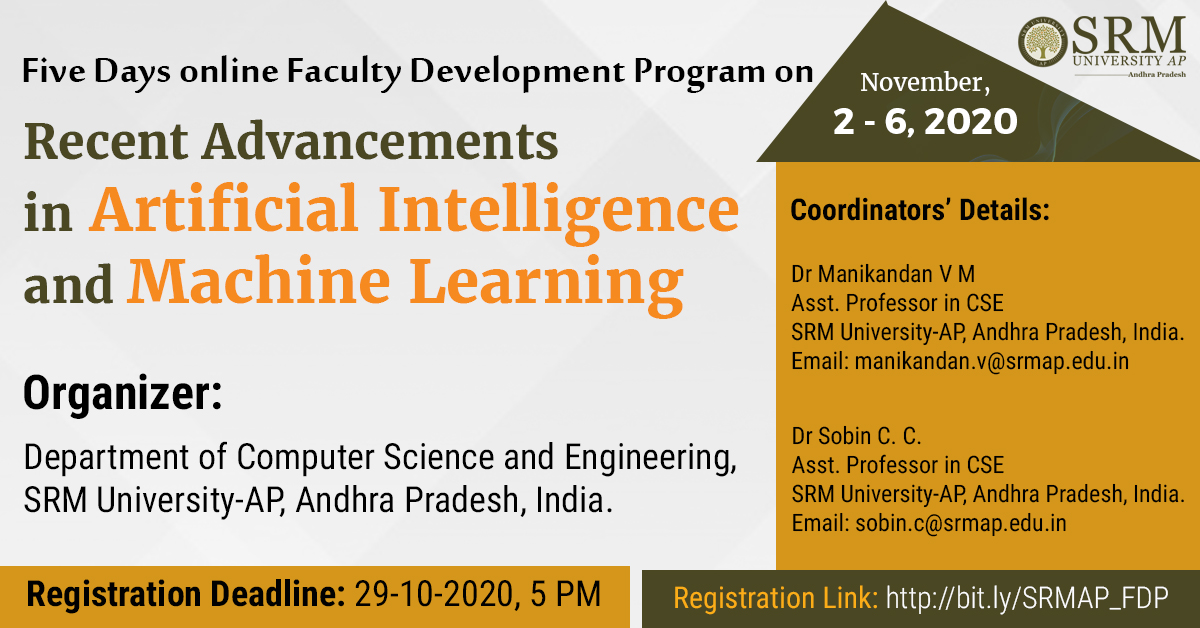 Department of Computer Science and Engineering, SRM University-AP, Andhra Pradesh is orchestrating a five-day online Faculty Development Programme (FDP) on “Recent Advancements in Machine Learning and Artificial Intelligence” from November 2, 2020, till November 6, 2020. The programme will be split into two sessions, where the first session will be held from 9.30 AM to 11 AM, and the second session will commence at 11.30 AM and end at 1 PM. During the FDP, Resource persons will be sharing knowledge during the morning sessions of the FDP to inspire, and mentor the faculty. Among the venerated speakers, Prof Dipti Prasad Mukharjee, Professor, Electronics and Communication Sciences Unit, ISI Kolkata, India will be delivering a lecture on “Machine Learning Techniques for Computer Vision”. Further, Dr V Masilamani, Associate Professor, Computer Engineering, Indian Institute of Information Technology Design and Manufacturing (IIITDM) Kancheepuram, Tamil Nadu, India, will be sharing insights on “Machine Learning for Image Quality Assessment”.
Department of Computer Science and Engineering, SRM University-AP, Andhra Pradesh is orchestrating a five-day online Faculty Development Programme (FDP) on “Recent Advancements in Machine Learning and Artificial Intelligence” from November 2, 2020, till November 6, 2020. The programme will be split into two sessions, where the first session will be held from 9.30 AM to 11 AM, and the second session will commence at 11.30 AM and end at 1 PM. During the FDP, Resource persons will be sharing knowledge during the morning sessions of the FDP to inspire, and mentor the faculty. Among the venerated speakers, Prof Dipti Prasad Mukharjee, Professor, Electronics and Communication Sciences Unit, ISI Kolkata, India will be delivering a lecture on “Machine Learning Techniques for Computer Vision”. Further, Dr V Masilamani, Associate Professor, Computer Engineering, Indian Institute of Information Technology Design and Manufacturing (IIITDM) Kancheepuram, Tamil Nadu, India, will be sharing insights on “Machine Learning for Image Quality Assessment”.Moving ahead with the FDP, Dr Deepak Mishra, Associate Professor & Head, Avionics Department Indian Institute of Space Technology (IIST), Trivandrum, Kerala, India, will host a session on “Machine Learning Applications in Remote Sensing”. Another session will be held on “Object and Image Memorability Analysis using Deep Learning Approach” by Dr Arjit Sur, Associate Professor, Computer Science and Engineering, IIT Guwahati, India. In addition, Dr A Vadivel, Associate Professor, Computer Science and Engineering, SRM University-AP, Andhra Pradesh, has been requested to conduct a session on “India Facial Expression Classification Using Machine Learning”. Apart from this, Dr Amal Dev P, Assistant Professor, Computer Science and Engineering, IIT Guwahati, India will be discussing the “Applications of AI in Computer Graphics”.
Dr Deepak Ranjan Nayak, Assistant Professor, Computer Engineering, MNIT Jaipur, Rajasthan, India, will be speaking on “Medical Image Processing using Deep Learning” whereas, Dr Sanjay Kumar Panda, Assistant Professor, Computer Science and Engineering, NIT Warangal, Telangana, India have chosen the topic “Case Study of Machine Learning: Recommender Systems” for his lecture during the FDP. Also, the department of CSE will be welcoming Dr Subhankar Mishra, Assistant Professor, Computer Science, National Institute of Science Education and Research (NISER), Bhubaneswar, India, and Dr Jatindra Dash, Assistant Professor, Computer Science and Engineering, SRM University-AP, Andhra Pradesh, India, to deliver a talk on “Secure and Private Machine Learning”, and “Texture Classification using Machine Learning”, respectively. Post graduate and research students, along with faculty across various institutions with background knowledge in Computer Science and/or Electronics Engineering are urged to attend the FDP to augment their horizon of knowledge, and receive an e-certificate on successfully completing the entire five-day FDP.
Registration Link: Please Click Here
Brochure: Please Click Here
Coordinators’ Details:
Dr Manikandan V M
Assistant Professor, Department of Computer Science and Engineering
EMAIL: manikandan.v@srmap.edu.inDr Sobin C C
Continue reading →
Assistant Professor, Department of Computer Science and Engineering
EMAIL: sobin.c@srmap.edu.in - 72nd Outreach Programme of IIRS-ISRO on “Basics of Geocomputation and Geoweb Services” October 6, 2020
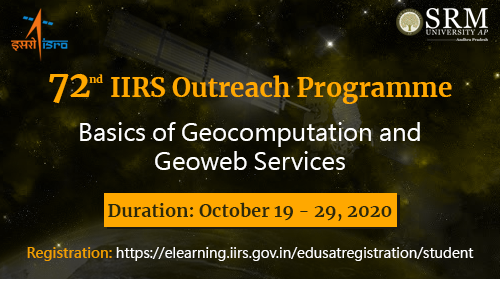 Indian Institute of Remote Sensing (IIRS) -Indian Space Research Organization (ISRO) presents 72nd outreach programme titled “Basics of Geocomputation and Geoweb Services”, which can be availed by the students of SRM University-AP, Andhra Pradesh.
Indian Institute of Remote Sensing (IIRS) -Indian Space Research Organization (ISRO) presents 72nd outreach programme titled “Basics of Geocomputation and Geoweb Services”, which can be availed by the students of SRM University-AP, Andhra Pradesh. Geocomputation is an emerging field that uses computational techniques such as neural networks, heuristic search, and cellular automata, for spatial data analysis. It is evolving as an essential scientific realm that encompasses techniques of geographical information systems, neurocomputing, heuristic search and cellular automata.
Students of SRM AP are recommended to participate in this immensely beneficial programme from October 19, 2020 till October 29, 2020. During the programme, attendees will be introduced to Geocomputation – technology and applications, online GIS and geo-web services, open geodata repositories, and ISRO geoweb services for thematic applications, programming concepts for geo-computation, introduction to Python and R, and much more.
Programme Schedule: Please Click Here
Registration Link: Please Click Here
For further details, Visit Here
Continue reading →

